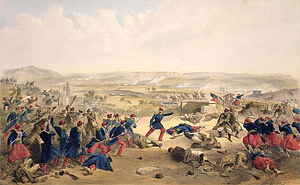Tchernaya
| Battle of the Chernaya | |||||||
|---|---|---|---|---|---|---|---|
 Battle of the Tchernaya, August 16th 1855, plate from 'The Seat of War in the East', pub. by Paul & Dominic Colnaghi & Co., 1856 (litho), Simpson, William 'Crimea' (1823-99). |
|||||||
|
|||||||
| Belligerents | |||||||
|
|
|
||||||
| Commanders and leaders | |||||||
|
|
|
||||||
| Strength | |||||||
|
French: 18,000 Sardinians: 9,000 Ottomans: 10,000 |
Russians: 58,000 |
||||||
| Casualties and losses | |||||||
| 1,700 killed, wounded and missing | 2,273 killed 1,742 missing 4,000 wounded |
||||||
The Battle of the Chernaya (Battle of Tchernaïa, Сражение у Черной речки, Сражение у реки Черной, literally: Battle of the Black River) was a battle by the Chornaya River fought during the Crimean War on August 16, 1855. The battle was fought between Russian troops and a coalition of French, Sardinian and Ottoman troops. The Chornaya River is on the outskirts of Sevastopol. The battle ended in a Russian retreat and a victory for the French, Sardinians and Turks.
The battle was planned as an offensive by the Russians with the aim of forcing the Allied forces (French, British, Sardinian, and Ottoman) to retreat and abandon their siege of Sevastopol. Czar Alexander II had ordered his commander in chief in the Crimea, Prince Michael Gorchakov to attack the besieging forces before they were reinforced further. The Czar hoped that by gaining a victory, he could force a more favorable resolution to the conflict. Gorchakov didn’t think that an attack would be successful but believed the greatest chance of success to be near the French and Sardinian positions on the Chornaya River. The Czar ordered the hesitating Gorchakov to hold a war council to plan the attack. The attack was planned for the morning of August 16 in the hope to surprise the French and Sardinians as they had just celebrated the Feast day of the Emperor (France) and Assumption Day (Sardinians). The Russians hoped that because of these feasts the enemy would be tired and less attentive to the Russians.
58,000 Russian troops in two army corps under Prince Michael Gorchakov fought against 28,000 French and Sardinian troops under French General Aimable Pélissier and Italian General Alfonso Ferrero La Marmora. Although the British correspondents were amazed at the courageousness and impetuosity of their attack, the assault of the Russian army was handicapped by poor organization and lack of experienced soldiers which, due to Sevastopol, forced their corps to consist mostly of militia.
...
Wikipedia
